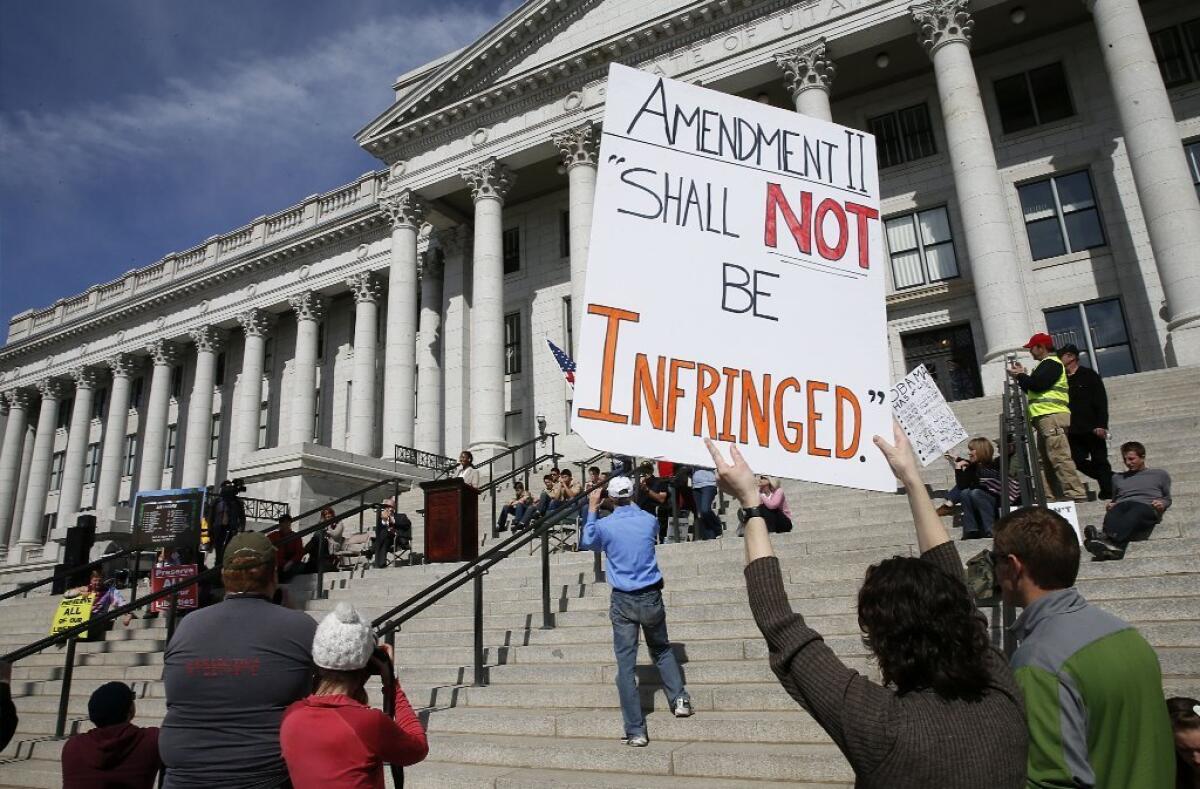McManus: Gun control, DOA

- Share via
President Obama pleaded with Congress last week to remember the victims of December’s schoolhouse shootings in Connecticut and tighten the nation’s gun laws. “Shame on us if we’ve forgotten,” he said. “Don’t get squishy.”
But four months after the Newtown killings, there’s no majority in the Senate yet for the measure Obama hopes will be the centerpiece of new regulation: expanded background checks for gun purchasers. At least six of the 55 Democrats in the Senate have not committed to vote yes when the issue comes to the floor later this month.
Take Sen. Kay Hagan (D-N.C.), a first-term senator who is likely to face a tough battle for reelection next year.
Even though an Elon University poll last month found that 93% of North Carolina voters favor background checks for almost all gun purchasers, that’s not what Hagan’s hearing from many of her constituents. When gun control is in the news, her voicemail fills with warnings from North Carolinians threatening to throw her out of office if she tries to limit their gun rights.
So what’s Hagan’s position? Ambushed by a North Carolina television station last week, she sounded, well, squishy.
“I think that most people today expect to have a criminal background check done before somebody purchases a gun,” she said. “So we will certainly want to see how that provision is laid out in the bill…. I’m going to see what it is, how it applies, and look into that.”
What’s happened to Hagan is the same thing that has happened to other endangered Democrats and the few moderate Republicans who might vote for stronger background checks: They’ve come face-to-face with the power of the National Rifle Assn. The group has mobilized its members against all of Obama’s post-Newtown proposals. Its opposition has helped doom liberals’ hopes for a ban on assault weapons or limits on ammunition clips. So now the NRA has taken aim at the most important remaining item on Obama’s wish list: tighter background checks.
The NRA’s campaign is even more fervently anti-regulation than in the past. As recently as 1999, the organization supported near-universal checks for gun purchasers to weed out criminals and the mentally ill, but no longer. Now, the NRA is stoking fears that background checks will lead to a national gun registry, despite language in the bill that specifically prohibits one. The NRA and its supporters have also warned that the expanded checks could force fathers to ask permission from the federal government before giving guns to their sons, even though the Senate proposal exempts family transactions.
Meanwhile, the NRA has made sure that lawmakers like Hagan hear from its members every week.
“The NRA has such deep grass roots,” one longtime proponent of gun control told me. “They have made their members feel that they are the last remaining bulwark to protect the 2nd Amendment. The members believe it’s their duty.”
Support for stricter gun controls is far broader, but not nearly as deep. A variety of organizations, including one led by former Rep. Gabrielle Giffords (D-Ariz.), have tried to gin up public campaigns, and the parents of the slain children of Newtown have returned to Washington repeatedly. New York Mayor Michael R. Bloomberg has pledged more than $12 million to the cause, launching television advertisements in the states of senators who, like Hagan, are on the fence.
But the results of those efforts remain uncertain. The pro-gun-control camp is divided by disagreements over how far to compromise. Fans of the assault weapons ban are angry at Senate Majority Leader Harry Reid (D-Nev.) for decreeing that their favorite measure didn’t stand a chance. Proponents of background checks are wrestling with demands that they water down their proposals to attract votes.
As a result, the debate in the Senate later this month is shaping up as an epic in three acts.
First, Reid and Sen. Charles E. Schumer (D-N.Y.) will try to make a deal with one of the most conservative Republicans in the Senate, Tom Coburn of Oklahoma. Coburn has said he can support near-universal background checks, as long as no one is required to keep a record of the transaction.
Next, on the Senate floor, Sen. Dianne Feinstein (D-Calif.) and others will make their all-but-doomed stands for an assault weapons ban and a limit on ammunition clips.
And, finally, five tea party conservatives led by Sens. Rand Paul (R-Ky.) and Ted Cruz (R-Texas) say they will stage a filibuster — maybe even the old-fashioned talking kind — to try to keep the bill from reaching a final vote. (That’s another factor on the NRA’s side: A bill needs 60 votes to move forward.)
Since any bill that survives that gantlet then goes to the conservative-dominated House of Representatives, meaningful gun legislation seems unlikely this year.
If the NRA succeeds in blocking universal background checks that are supported by at least 85% of Americans, shame on it. But shame on the measure’s supporters, too — for failing to beat the NRA at its own game: making legislators fear the consequences if they vote the wrong way.
More to Read
Sign up for Essential California
The most important California stories and recommendations in your inbox every morning.
You may occasionally receive promotional content from the Los Angeles Times.











